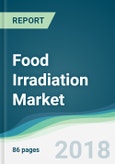Food irradiation market is projected to grow at a CAGR of 3.90% over the forecast period to reach US$269.139 million by 2023 from US$213.998 million in 2017. Food irradiation is a food safety technology that can eliminate disease-causing microorganisms from the food by the process of exposing foodstuff to ionizing radiation without affecting the nutritional value of the irradiated food. Increasing concerns over the food-borne diseases and high food losses from infection, contamination, and spoilage are some of the key factors driving the food irradiation market. Growing demand for meat and poultry farm products is also fuelling the demand for food irradiation solutions. Rising public concerns over food safety and increased demand for raw food products such as lettuce or spinach will provide ample opportunities to global food irradiation solution providers over the next six years. Moreover, emerging trend of including new and exotic fruits and vegetables in diet will further augment the demand for food irradiation to ensure the safety and quality of these new food products. However, misconception about the technology among consumers along with high prices of irradiated food products will hinder the market growth during the forecast period. Other restraints include lack of irradiation facilities and the reluctance of manufacturers to use this technology as it adds costs, thereby affecting the profit margin.
This research study examines the current market trends related to the demand, supply, and sales, in addition to the recent developments. Major drivers, restraints, and opportunities have been covered to provide an exhaustive picture of the market. The analysis presents in-depth information regarding the development, trends, and industry policies and regulations implemented in each of the geographical regions. Further, the overall regulatory framework of the market has been exhaustively covered to offer stakeholders a better understanding of the key factors affecting the overall market environment.
Identification of key industry players in the industry and their revenue contribution to the overall business or relevant segment aligned to the study have been covered as a part of competitive intelligence done through extensive secondary research. Various studies and data published by industry associations, analyst reports, investor presentations, press releases and journals among others have been taken into consideration while conducting the secondary research. Both bottom-up and top down approaches have been utilized to determine the market size of the overall market and key segments. The values obtained are correlated with the primary inputs of the key stakeholders in the Food Irradiation value chain. Last step involves complete market engineering which includes analyzing the data from different sources and existing proprietary datasets while using various data triangulation methods for market breakdown and forecasting.
Market intelligence is presented in the form of analysis, charts, and graphics to help the clients in gaining faster and efficient understanding of the market.
Major industry players profiled as part of the report are Nordion (Canada) Inc, GRAY STAR, Tecleor, and Sterigenics International LLC among others.
Segmentation:
By Source of Radiation
By Food Type
By Geography
This research study examines the current market trends related to the demand, supply, and sales, in addition to the recent developments. Major drivers, restraints, and opportunities have been covered to provide an exhaustive picture of the market. The analysis presents in-depth information regarding the development, trends, and industry policies and regulations implemented in each of the geographical regions. Further, the overall regulatory framework of the market has been exhaustively covered to offer stakeholders a better understanding of the key factors affecting the overall market environment.
Identification of key industry players in the industry and their revenue contribution to the overall business or relevant segment aligned to the study have been covered as a part of competitive intelligence done through extensive secondary research. Various studies and data published by industry associations, analyst reports, investor presentations, press releases and journals among others have been taken into consideration while conducting the secondary research. Both bottom-up and top down approaches have been utilized to determine the market size of the overall market and key segments. The values obtained are correlated with the primary inputs of the key stakeholders in the Food Irradiation value chain. Last step involves complete market engineering which includes analyzing the data from different sources and existing proprietary datasets while using various data triangulation methods for market breakdown and forecasting.
Market intelligence is presented in the form of analysis, charts, and graphics to help the clients in gaining faster and efficient understanding of the market.
Major industry players profiled as part of the report are Nordion (Canada) Inc, GRAY STAR, Tecleor, and Sterigenics International LLC among others.
Segmentation:
By Source of Radiation
- Electron Beam
- Gamma Rays
- X-Rays
By Food Type
- Fruits and Vegetables
- Spices
- Grain Foods
- Meat and Poultry
By Geography
- North America
- U.S.
- Canada
- Mexico
- Others
- South America
- Brazil
- Others
- Europe
- UK
- Germany
- France
- Others
- Middle East and Africa
- Saudi Arabia
- UAE
- Israel
- Others
- Asia-Pacific
- Japan
- China
- India
- Australia
- Others
Table of Contents
1. Introduction3. Executive SummaryList Of FiguresList Of Tables
2. Research Methodology
4. Market Dynamics
5. Food Irradiation Market By Source of Radiation
6. Food Irradiation Market By Food Type
7. Food Irradiation Market By Geography
8. Competitive Intelligence
9. Company Profiles
Companies Mentioned
- GRAY STAR, Inc.
- Nordion (Canada) Inc.
- SADEX Corporation
- STERIS
- Sterigenics International LLC
- Tecleor LLC
Methodology

LOADING...








